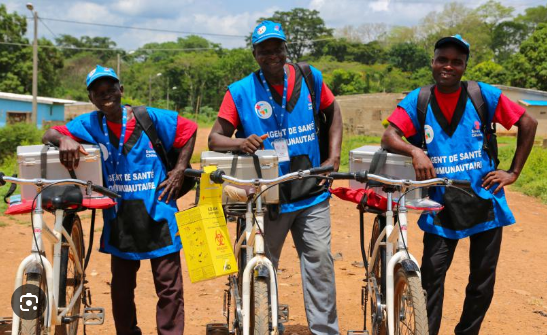How Cote d’Ivoire is tackling malaria in remote areas
According to the World Health Organization, the majority of malaria cases and deaths in Sub-Saharan Africa occur in children under five, with about 80% of malaria deaths in the region attributed to this age group. In Cote d’Ivoire, which is one of the top 10 countries with the highest number of malaria cases, the disease accounted for 3% of global cases in 2022, as reported by the WHO.
To combat malaria, a team of 8,300 community health workers in Cote d’Ivoire, equipped with bicycles and medical supplies, play a crucial role in reducing malaria-related deaths among young children by providing early diagnosis and treatment. By cycling between remote villages, these workers have managed to decrease malaria cases by up to 70% in certain areas this year.
Despite global efforts to reduce malaria cases stalling in recent years, the World Health Organization is using World Malaria Day 2024 on April 25 to reignite the fight against this deadly disease that claims the lives of approximately half a million children annually.
Community health workers like François Kouadio, who received training in 2015, are supported by organizations like Save the Children and local partners to ensure that families affected by malaria receive timely assistance. François conducts blood tests on children, administers treatment for malaria, and provides care for pregnant women in the village to minimize their risk of contracting the disease.
Prisca was able to quickly seek help from François, a community health worker living in the same village. Thanks to early diagnosis and treatment, along with François’ daily visits, one-year-old Charlene* was saved from malaria and can now enjoy playing with her brothers once again.
François has expanded his work in recent years, thanks to having a bicycle. He visits up to eight families a day within a five-kilometre radius, pedaling along dirt roads to reach rural villages nestled among green forests. During his visits, he checks for sick children, provides appropriate treatment, and raises awareness about malaria prevention.
François’s dedication and hard work have earned him respect within the community, where he is even referred to as ‘doctor’. The sound of bells on the bikes used by François and three other community health workers brings comfort to the villagers, knowing that accessible healthcare is available.
Prisca expressed her fear when her daughter fell ill, but thanks to the effective medication and the confidence they had in the treatment, her family witnessed her recovery. The community health workers, who are kind and provide free tablets, play a crucial role in bringing comfort to the village and helping children recover from sickness.
François shared that between January and March of this year, he tested 31 children with fevers, out of which 24 tested positive for malaria and received treatment. This marked a significant decrease compared to previous years, where between 20 and 30 children were registered with malaria in just one month. The increased awareness about malaria and the use of mosquito nets have contributed to this drop in cases.
François acknowledges that many people avoid visiting health centers due to financial constraints. However, he remains committed to caring for children and raising awareness about malaria prevention after witnessing numerous deaths caused by the disease. His efforts extend beyond encouraging people to seek appropriate treatment; he also emphasizes the importance of protecting oneself by using mosquito nets, maintaining clean households, and covering water storage containers.
In Cote d’Ivoire, local radio stations play a crucial role in the fight against malaria by broadcasting messages on disease treatment and prevention. The overall objective in Cote d’Ivoire is to reduce malaria incidence and mortality by at least 75% by 2025 compared to 2015.
Malaria is a disease transmitted by female mosquitoes carrying parasites. If left untreated, it can be fatal. In 2022, there were approximately 249 million cases of malaria worldwide, with children under the age of five being the most vulnerable. The infection also poses significant risks during pregnancy.
Dr. Yssouf Ouattara, Save the Children’s Malaria Project Director in Cote D’Ivoire, emphasizes that malaria is preventable and treatable. However, without access to healthcare, it can become deadly, particularly for young children. Innovative community health projects, such as the one implemented by Save the Children in Cote D’Ivoire, play a crucial role in improving outcomes by enabling community health workers to provide care to children at home and within communities.
Save the Children has been actively working in Cote D’Ivoire since 1991, focusing on education, health and nutrition, child protection and rights, and combating child poverty. The malaria project is implemented in approximately 53 health districts and over 1,270 health areas in collaboration with six other organizations.




